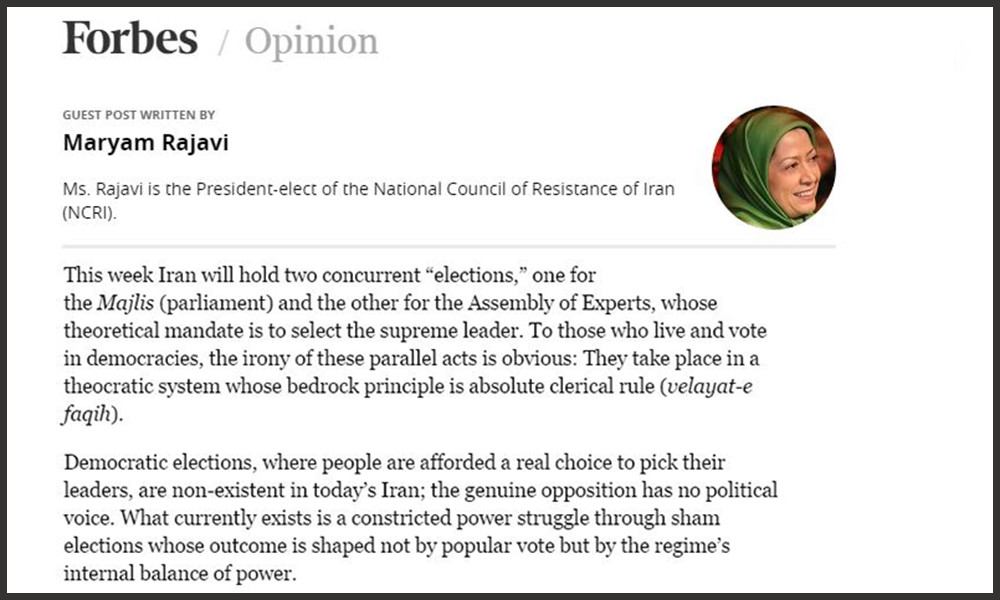Forbes- February 26, 2016 No Real Choice In The Iran ‘Elections’ By Maryam Rajavi

To those who live and vote in democracies, the irony of these parallel acts is obvious: They take place in a theocratic system whose bedrock principle is absolute clerical rule (velayat-e faqih).
Democratic elections, where people are afforded a real choice to pick their leaders, are non-existent in today’s Iran; the genuine opposition has no political voice. What currently exists is a constricted power struggle through sham elections whose outcome is shaped not by popular vote but by the regime’s internal balance of power.
All candidates in the regime are required by law to exhibit “heart-felt and practical allegiance” to absolute clerical rule as a prerequisite for their candidacy.
Even then, the faithful will have their qualification determined by the Guardian Council whose six clerics are installed by the supreme leader while the remaining six jurists are appointed by the head of the judiciary who himself is selected by the supreme leader.
The regime’s supreme leader Ali Khamenei has also formed a special committee consisting of his own chief of staff, the commander of the Islamic Revolutionary Guard Corps (IRGC), the IRGC commander of Tehran and the secretary of the Guardian Council. This committee’s supreme power trumps that of the Guardian Council. Its mission is to purge, or at least dramatically undermine the rival faction from the elections, thus safeguarding Khamenei’s power.
A choice for Khamenei
But this year, Khamenei is faced with a difficult choice: If he decides to grant a larger share to the rival faction, he would deepen the chasm at the highest echelons of the ruling elite, thereby undermining his own hegemony, weakening the regime in its entirety, and paving the way for tsunami-like uprisings. If, on the other hand, he decides to purge of the rival faction, he would aggravate internal tensions, thereby socially isolating the regime further while jeopardizing the political and economic advantages of the nuclear agreement. In a word, the regime will become even more vulnerable.
There are growing indications that Khamenei has chosen the second option. The Guardian Council has disqualified the bulk of candidates affiliated with the former president Ali Akbar Hashemi Rafsanjani and his protégé Hassan Rouhani. Even a number of sitting members of parliament along with other prominent figures have been excluded.
By resorting to what amounts to a political slaughter and marginalization of officials who have served the theocracy for over three decades, Khamenei seeks to buy more time for himself. At the same time, weary of his own fate, Rouhani has opted for silence. He is neither willing nor able to initiate reforms. His priority is to keep his own position and preserve the regime as a whole.
The predominant judgment in the West hinged on the hope that last year’s nuclear deal would generate a change of behavior in the Iran theocracy, triggering internal reforms while strengthening so-called moderates in the elections after the lifting of international sanctions.
The West has fallen victim to an amateur sleight of hand
But hedging bets on a theocratic ruler bringing in illusive moderates through sham elections is sheer nonsense. The West has fallen victim to an amateur sleight of hand. Who are the so-called moderates even if they manage to come out of the ballot box after all? As examples, one is the current Intelligence Minister and another two are former Intelligence Ministers, all of whom have played a key role in the slaughter and execution of thousands of Iranians and in the export of terrorism.
The duality of a regime which holds “elections” and finds its power in draconian human rights abuses and unchecked supreme leadership flies in the face of democratic principles and progress. And the West has failed to grasp that the regime ultimately took a step back because of its vital need for sanctions relief rather than the desire to change its behavior. Indeed, had the opposition Mujahedin-e Khalq (MEK/PMOI), not exposed Tehran’s nuclear weapons program, a scenario akin to that of North Korea would have occurred in Iran, albeit on a much more dangerous scale. The failure to understand this reality prevented the complete dismantling of that program.
A realistic assessment points to crippling crises with which the regime is grappling; the always looming threat of social uprisings reignited by a profoundly restless population and the stubborn economic downturn are the building blocks of these crises. As such, doing business with Tehran will provide financial nourishment to the Revolutionary Guards and companies that prop up the mullahs’ war machine in Syria while filling the coffers of Hezbollah and other criminal militias in the region.
Theocracy undermines democracy
Real reform would be possible only through the wholesale rejection of the theocracy.
The West should respect the will of the Iranian people and the Iranian Resistance to institute real democracy and popular sovereignty. They must hold the Iranian regime to account for its increasing executions and its intensification of domestic crackdown, and refuse to tolerate the regime’s regional meddling.
The National Council of Resistance of Iran (NCRI) seeks a secular and pluralistic government committed to gender equality and peaceful co-existence in the region and throughout the world. It views the ballot box as the only source of legitimacy for any government. But as long as the current theocracy is in power, this enduring dream cannot be realized.
Ms. Rajavi is the President-elect of the National Council of Resistance of Iran (NCRI)
- Tags: freedom, fundamentalism, Iran, Middle East, NCRI

